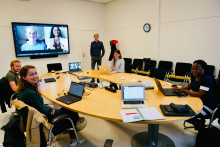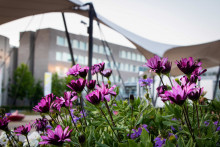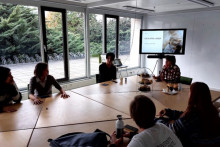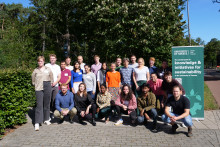The Green Hub has been up and running for about six months now. How do you look back on the start?
Baker: ‘We began in the midst of a pandemic, but looking back I am very proud with what my team has been able to achieve. We have a group of 15 people: ten students who act as student Green Officers, and four students who work as specialised support officers. And then there’s me, as the manager and coordinator. These first few months were very useful for getting to know this institution and all our dozens of different stakeholders. It helped us to define our role and place within the UT.
Still, what I’m missing is the possibility to get together with the team and get to know them on both a personal and professional level. I feel like they are missing out on a lot because of the pandemic. We created a physical space on the third floor of the Bastille, but we haven’t even been able to put it to proper use yet. However, the team is looking forward to being able to meet up and start using the office, once safe and possible.’
What role have you defined for the Green Hub, especially in regards to the multitude of sustainability initiatives at the UT?
‘There is a lot already happening, in research, education, policy-wise, in start-ups, with student initiatives like SUsTain… we’re still collecting and making sense of all the existing activities. As the Green Hub Twente, we want to complement what is already there and be the central platform for sustainability at the UT, with our team being intrapreneurs. I’d like to compare us to how the aerospace company Lockheed Martin created Skunk Works, as a group within their organization with a high degree of autonomy and room for innovation. Having it set up that way, Skunk Works was able to rapidly develop airplanes like the SR-71 that could fly over Mach 3. Within the UT there is a lot of space and support for us to develop and grow, as intrepreneurs embedded within this institution.
Being a central platform requires us to have a 360 degree view. So besides collecting knowledge, connecting people and developing and accelerating initiatives, we have a mediating role. A good example was back in November, when University Rebellion called the UT to action. We morally support University Rebellion and Extinction Rebellion, but we also want to mediate between them, the executive board and the SEE programme of the UT. We need both approaches – both sides of the spectrum in order to achieve long-term sustainability goals. As the Green Hub, we aim to facilitate the dialogue and action. It’s how philosopher Hannah Arendt once described the concept of praxis. Students can act as change agents and redesign the system from the inside, as well as push for change from the outside.’
How do you aim to channel this towards actions and activities for this year?
‘As there is already a lot going on at UT, we want to collect and present information on one central platform. There is a lot going on and we think we can showcase that in a smart accessible way. Another project is aimed at food, we want to first identify the needs of the UT community, and together with the SEE-programme discuss with Appèl and the Coop as to how they can improve the choice of vegan and vegetarian options in catering. Furthermore, we’re working with our partners, UT start-up Plaex, to try to reduce waste on campus. Because, based on research Suez did last year for the SEE-Programme and CFM, we think waste separation can be improved a lot by reducing the amount of organic waste that usually ends up in the residual waste. Also, we plan to assist the numerous student associations and organisations in managing their own sustainability efforts.’
What caught my eye in your annual plan, is that you want to ‘understand the barriers preventing students and staff from becoming more engaged and enthused in sustainability’…
‘I think the green movement has failed to move the needle in public opinion in the last decades. Half of all man-made carbon emissions in global history took place in the last thirty years. Besides it being an uphill battle against powerful lobbyists, I think there is something wrong with how we are engaging people. It’s hard to unite across so many diverse initiatives, where some people feel that their voices are not heard or really used for action within big institutions.
I think we need to steer away from focussing on individual accountability, because it feels like it’s mostly privileged people pointing fingers, which allows Big Oil to scapegoat the individual. We need to critically reflect on how to bond inclusively to take powerful action together as a collective force against the fossil fuel lobby. That’s why I think the sustainability movement needs to be diverse and intersectional – so that we can take people by the hands out of their comfort zone. We are trying to set a good example here: diversity and intersectionality are part of our core values and was one of the focal points in setting up this team. We want to also lower barriers of entry by becoming this central hub for people to realise their ideas and initiatives.’







